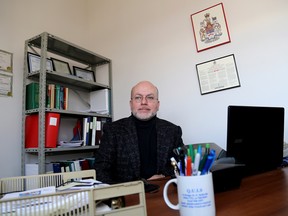QUIS ready to help refugees

Article content
The executive director of the Quinte United Immigration Services is waiting on word on whether or not the organization will be called to action in the event that hundreds of refugees are relocated to Trenton.
8 Wing base commander Col. Colin Keiver broke the news Thursday at a Quinte West Chamber of Commerce meeting, saying the base is winterizing the current air cadet accommodations in anticipation of the arrival of approximately 950 refugees here. He stated the base is waiting on further instruction from the federal government.
Orlando Ferro, executive director of QUIS, said Friday morning that the immigration services organization does not know how, or if, they will be involved.
“The best way to do it is to wait, be prepared no matter what, and wait for the information when it comes. If we are needed, then we are there and we have done our work,” said Ferro Friday.
He did say that QUIS, anticipating the relocation of large number of refugees may be a possibility, has been working on a report during the last few months highlighting what they could do to help. Ferra said the information was shared earlier this week at city hall.
QUIS was deeply involved in Canadian Forces Operation PARASOL in 1999 – when approximately 5,500 refugees from Kosovo were brought to Canadian Forces bases, including Trenton – and staff put together a report on what worked and what didn’t at that time.
“We were just looking at the different scenarios. One of the things we need is preparedness, no matter what happens. If we see or foresee a situation that could be needing our input and assistance, then we try to make sure we are ready for that.”
“What we did is took a capacity survey for accommodations, for services and anything else that refugees would need, should they be located in the area.”
Learning from lessons experienced in 1999, Ferro said coordinated planning among agencies is key.
At that time, “bureaucratic burden” and lack of proper record taking affected long-term settlement planning. Lack of communication and coordinating effort among volunteers and agencies created, at times, a duplication of tasks.
A lack of interpreters added to confusion and miscommunication. There was also an overwhelming community response in a short time frame, but little capacity to store the donated items.
Ferro said there are about about 250 Arabic interpreters in the province, but none of them are currently in the region. Ideally, interpreters would be on the ground to provide immediate services for intake and assessment for the refugee families.
A focus also needs to be placed on a database application collecting information during the intake process, needs assessment and a settlement plan for relocation and long-term services delivery. Also important is adequate interpreters and volunteers with training on the historic, cultural and political backgrounds of the refugees and experience with war trauma and PTSD.
Communication with the base has been sporadic but QUIS has been passing their suggestions on to the federal government, specifically the Ministry of Citizenship and Immigration.
“We stated what we can do, what we are ready to do and we are waiting on the final instructions,” he said.
Currently, 10,000 refugees are screened and ready to be deployed to Canada from refugee camps.
“Concerns about security should be put in perspective. Those refugees have been living in the refugee camps in Lebanon and Jordan since 2011, so this is even prior to the rise of ISIS.”
Refugees have been double-screened, first through the United Nations and the second was through Canadian security services.
“There should not be any concerns about security. The level of scrutiny for security checks is very high.”
emily.mountney@sunmedia.ca